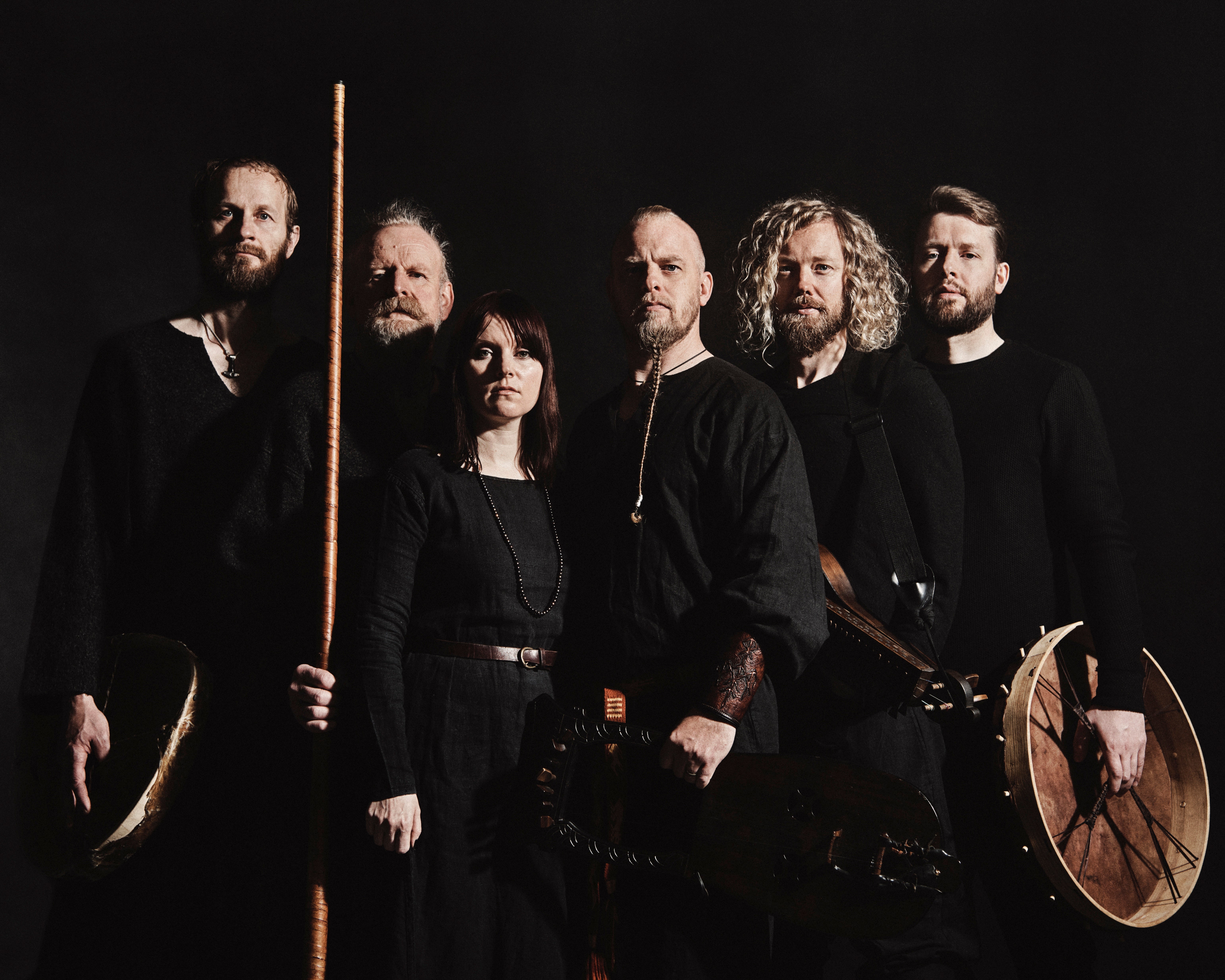Valhalla bangers: The Scandi bands redefining Norse folk music
They’re on the soundtrack to Vikings and Assassin’s Creed but acts like Wardruna and Heilung are far from novelty Norse power. In tough times, they look to ancient mythology for clues about the present, they tell Leonie Cooper


Your support helps us to tell the story
From reproductive rights to climate change to Big Tech, The Independent is on the ground when the story is developing. Whether it's investigating the financials of Elon Musk's pro-Trump PAC or producing our latest documentary, 'The A Word', which shines a light on the American women fighting for reproductive rights, we know how important it is to parse out the facts from the messaging.
At such a critical moment in US history, we need reporters on the ground. Your donation allows us to keep sending journalists to speak to both sides of the story.
The Independent is trusted by Americans across the entire political spectrum. And unlike many other quality news outlets, we choose not to lock Americans out of our reporting and analysis with paywalls. We believe quality journalism should be available to everyone, paid for by those who can afford it.
Your support makes all the difference.If social media’s unlikely sea shanty trend has got you craving a more traditional kind of soundtrack this winter, then you’re in luck. With modern life so decidedly rubbish, the allure of ancient sounds has never been stronger, especially if you head to Scandinavia, where Nordic folk music is experiencing its biggest boom since the Vikings last took to the high seas of Iron Age Europe.
Norway’s Wardruna are leading the charge. Myth and legend is at the root of their lyricism and their epic, meditative sound wouldn’t sound out of place in a particularly windswept episode of Game of Thrones. Their niche is somewhere in the Venn diagram between fans of hairy men with the build of Jason Momoa and chin-scratching metal purists.
Even over such modern technology as Zoom, Wardruna’s founder Einar Selvik looks the part. His long, plaited beard bobs thoughtfully as he ponders the academic process behind the band’s new album Kvitravn, which takes in everything from sorcery to spirit animals. “I always say that you shouldn’t climb into trees that don’t have roots,” says a poetic Selvik of his long-held fascination with history and stories with a vast lineage. “It’s about building on something solid.”
More learned scholar than stereotypical popstar, Selvik digs into Norse folklore on Kvitravn, with odes to stags, ravens and wolves as well as what he calls healing “medicine songs”. He calls upon archaeologists, historians and philologists when researching new songs and has himself given lectures about his work in universities spanning Oxford to Denver. “It’s about using the old culture in our relationship to nature and to each other and to something that is bigger than yourself,” explains Selvik of his reasons for digging up these tales and sounds of yore. “I give voice to certain things from the past, things that I feel are still relevant and that are worth learning from.”
To create this fantastical, century-skimming noise, Wardruna use a host of historical instruments, including bowed lyres known as taglharpas, as well as goat horns, flutes and the langeleik, which is similar to a German zither. “It’s a long list of strange, obscure items,” Selvik smiles. Listening to the stirring sounds these instruments make conjures up visions of going on great missions across many oceans, possibly leaving behind a lovely maiden who will weep constantly until you return. The makers of Assassin’s Creed certainly seem to think so, who brought Selvik in to create music for the latest Valhalla version of the popular video game, set during the Viking invasion of Britain.
The intensity of Wardruna’s sound also draws upon northern Europe’s most famous musical export after ABBA: black metal. “Scandinavian music is very much influenced by our surroundings – it’s quite grim and melancholic and dark, but we find the beauty in that,” says Selvik, who started his career as a member of metallers Gorgoroth and recently collaborated with Ivar Bjornson of extreme noise band Enslaved. Selvik is quick to notice the similarities between the two genres. “Early black metal is very much influenced by traditional tonality and of course the themes are the same: mythology and folklore,” he says.
Yet rather than burning churches, as fans of Norwegian black metal were often thought to spend their downtime doing, acolytes of this new wave of neo-folk are more likely to be found watching old episodes of Time Team, making small batch mead and whittling sticks found in the reclaimed woodland they tend to every Friday afternoon with a local community group. As if to prove the point, while gigs are off the table, Selvik is set to virtually headline the amateur historian’s answer to Glastonbury, That Jorvik Viking Thing – an online version of the York-based Viking Centre’s annual festival.
Wardruna’s new album also comes complete with the evocative smells of the Norwegian forest, should you want a full sensory experience. The idea was dreamt up by the band’s vocalist and arranger Lindy-Fay Hella, though her contributions to Wardruna’s sound is less wafty. They have a deeply political source, inspired by the ancient Sami culture of northern Scandinavia – an indigenous people historically maligned by Norway, Sweden, Finland, who claimed possession of their lands – linking back to her own Sami lineage. “The injustice these people have been treated with is similar to the history of the Native Americans,” she explains. “The fact that my great grandmother had to hide where she came from and who she was, made me angry. It feels right to have part of her with me in the way I sing.”
Heilung – whose members come from Denmark, Norway and Germany – take the traditional premise to rather more extreme ends. With the son of a pagan priest amongst their ranks, the trio’s future as singers of songs based on ancient relics and runes seemed fated. They describe their music as “amplified history”, wear replica Bronze Age clothing and lavish headdresses and, as part of their instrumental arsenal, boast a horse skin drum daubed with blood, a forearm bone and clay rattle filled with human ashes.
And they’re not the only ones with a customs-bothering set-up. Danish-Nordic musician Danheim’s Instagram feed features artful shots of handmade percussion staffs which use the bones of ravens – which is one thing to do with the rotting finds you might discover on a stroll in your local forest. His 2019 album Hringras, meanwhile, incorporated dead plants, deceased animals and human bone into a track about the transition from life to death, earning him a spot on the soundtrack of the final season of Vikings.
If animal detritus and body parts are all a bit too much then the most recent project from Danish act Myrkur might be less, well, terrifying. Fronted by songwriter and occasional Chanel model Amalie Bruun, the band shifted their metal sound into a more folk-facing territory on last year’s Folkesange. Using Wardruna favourites such as mandola and the fiddle-like nyckelharpa, the record reimagines traditional Scandinavian songs with Brunn’s devastating vocals soaring across vast sonic soundscapes. Or how about Sweden’s Skald, who sing in Old Norse and deploy shamanic drumming? Then there’s Forndom, whose gigs are not listed as tour dates, but as “rituals”, soundtracked by their 2020 album Faþir, brooding songs inspired by the “melancholic landscapes” of rural Sweden.
Above all, it seems that the natural world – bones and all – as well as the connection that ancient civilisations felt towards it is what binds these acts together. “From the first time I started to work with Wardruna, I felt there was a closeness to nature,” explains Lindy-Fay Hella. “In nature there is room for not only the nice things, but also ugliness and contrasts. I could never be part of a project where things have to be polished and clean, that would never work.” For now, these rugged sounds are perhaps the closest that most of us will get to the Scandinavian wilds for the foreseeable future. Time to start plaiting that beard, perhaps.
Wardruna’s album Kvitravn is out now via Music For Nations



Join our commenting forum
Join thought-provoking conversations, follow other Independent readers and see their replies
Comments